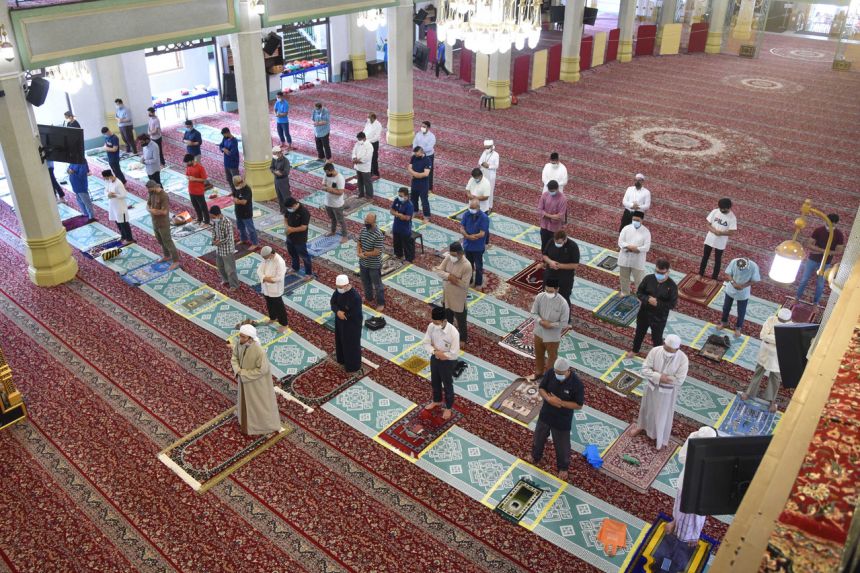Malay/Muslim Singaporeans have acted in an exemplary way during Covid-19 pandemic: Masagos
Sign up now: Get ST's newsletters delivered to your inbox

Measures that the community took in response to the coronavirus included the suspension of congregational prayers.
PHOTO: MUIS
Follow topic:
SINGAPORE - Malay/Muslim Singaporeans have acted in an exemplary way during the Covid-19 pandemic these past two years and helped prevent the virus from spreading further, Minister-in-charge of Muslim Affairs Masagos Zulkifli has said.
The community has embraced tough decisions and adapted to challenges posed by the virus, said Mr Masagos, who is also Minister for Social and Family Development and Second Minister for Health.
"For the last two years, our community has been exemplary in their response to Covid-19, particularly during the beginning of Covid-19 when we had to make very difficult decisions," said the minister during an interview with Malay/Muslim leaders on Monday (Dec 6).
This included the shutting down of mosques and the postponing of the haj pilgrimage, he added. Other measures that the community took in response to the coronavirus included the suspension of congregational prayers and adjusting to the inability to visit loved ones during Hari Raya celebrations.
Such adjustments from the community were only possible due to the support it gives to its religious leaders and medical experts who have been able to put up appropriate guidance, said Mr Masagos.
He made special mention of how the religious teachers here, or asatizah, rallied together to help the community understand the need for such decisions. Mr Masagos said that this is unlike many other countries, where there were a lot of disputes between religious scholars about why safety measures had to be taken.
While fatigue in the fight against Covid-19 might be setting in, Mr Masagos noted that the community here still supports the measures by the Government in the national efforts to address the coronavirus.
He highlighted other areas where Malays here have done well, including in education and work. The latest census data released in June showed that the community has increased the number of those with post-secondary qualifications.
The data also reflected that the number of Malays holding professional, managerial, executive and technical (PMET) jobs has increased, and that a larger proportion of them are employed in fast-growing sectors such as information and communications, financial and insurance services, and professional services.
But the data threw up a worrying trend regarding home ownership, noted Mr Masagos. Census 2020 showed that while most Malay families, like other Singaporean families, own their homes, the proportion of Malay households in rental flats has increased.
The data showed that the number of Malay households in one- and two-room Housing Board rental flats more than doubled in the past decade, from about 9,100 in 2010 to about 18,600 last year.
In comparison, the number went up from 28,000 to 28,700 for Chinese households, and from 4,600 to 6,800 for Indian households.
Mr Masagos said that to address this, the Government has introduced Project DIAN @ M3, a programme that seeks to improve the lot of Malay families in public rental flats by providing holistic support through national and community initiatives, with the aim of guiding them towards owning their own homes.
The scheme, which was launched on Dec 5, is managed by the Engagement Coordination Office under the Government's M3 programme.
M3 is a tie-up between self-help group Mendaki, the Islamic Religious Council of Singapore and Mesra, the People's Association Malay Activity Executive Committees Council.

